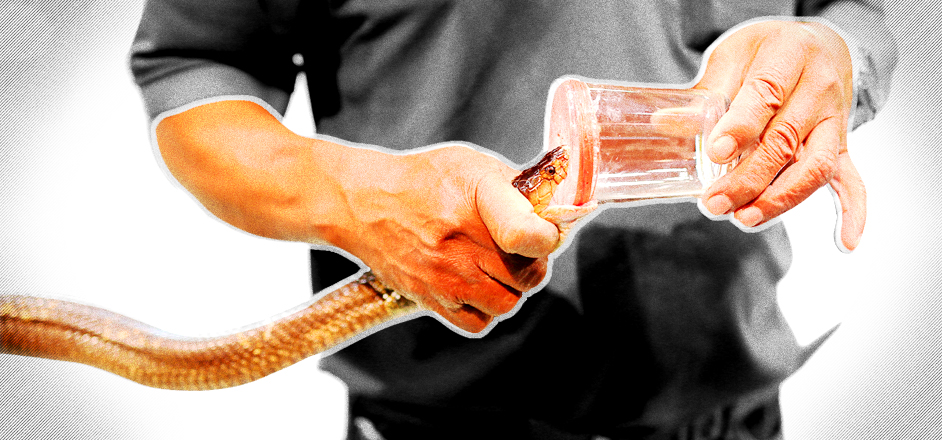There's an untapped cure for aging, dementia and disease out there, and it’s hiding in the venom of deadly snakes. Currently, this special substance it’s illegal to get, but, one man who we’ll call Lewis believes it’s worth breaking the law to bring it to the people.
Lewis is one of a growing group of adventurers and academics who think snake venom is an unexpected fountain of youth and maybe even a cure for cancer. Most folks who’ve realized its potential are working by the books to turn venom into a legal medicine, but Lewis doesn't want to wait for that shit — bureaucracy takes forever. Insead, he's hatching plans to smuggle illegal venomous snakes into his state, so that he can milk their venom and use syringes to inject himself and others for better health.
"A lot of people would say that the risk isn't worth the cost," Lewis says by phone. (We've agreed to change his name, since he's contemplating criminal activity that could imprison him.) "But if venom could extend someone's life, if it could slow down aging and prevent cancer and all this dementia and diseases — what's the risk /reward balance there?"
The risks are too big, says Stephen Mackessy, who studies snakes at the University of Northern Colorado. "That's a stupid thing to do," Mackessy says by phone. "It's not like smoking pot where we have a reasonable idea of what's going to happen. Microgram amounts kill."
Thousands of people every year die or lose a limb to snakebites. Most of those happen in Africa and Asia. But a handful of Americans do die from snakebites, and one kid even used snake venom to try and kill himself.
But science — including Mackessy's science — suggests venom from snakes such as copperheads is both a poison and a cure. Researchers are studying a compound in the venom — disintegrins — that could disintegrate all sorts of bad stuff, from tumors to herpes. The venom from snakes like the Eastern Green Mamba might treat alzheimer's — the most common cause of dementia — studies and news reports say. There's already anti-aging creams made from synthetic snake venom.
Real-world stories back up this idea. The Ancient Greeks knew about the connection between poison and cure; they transformed venom into medicine. Today, there are anecdotes of people who've watched their immune diseases disappear after an accidental venomous scorpion bike.
Mackessy calls snake venom "a potential gold mine for medicines." “We aren’t talking just a few novel drugs but entire classes of drugs,” Zoltan Takacs, a toxinologist and herpetologist, told National Geographic.
Mackessy's student, Anthony Saviola, published a paper this summer reporting that snake disintegrins could break up skin and lung cancer. But, Saviola emailed us to say that Lewis's planned renegade snake operation isn't a good idea "at all."
Nevertheless, Lewis is plowing ahead. He's following the lead of horde of self-injectors who have been shooting venom into their bodies for decades, and actually seem healthier for it. One of them, "Venom Superman" Steve Ludwin has been injecting himself for 30 years; he says it feels like injecting battery acid; but though he's nearing 50, he looks 10 years younger. His hero, Bill Haast, was bitten by snakes 172 times and he lived to be 100; his blood was used as an anti-venom to treat two dozen snakebite victims. Eight years ago today, Miami celebrated "Bill Haast Day."
These guys inspired thousands. Lewis has heard whispers of groups of underground self-injectors. And he's salivating at the possibility of bringing some of that good snake juju to the masses — consequences be damned.
"I'm in my mid-50s, going, what can I do to stop cancer and dementia," Lewis says. He doesn't have either yet, but he's worried. And, he concludes, "I don't have time for science to figure this out."





Leave a Reply
You must be logged in to post a comment.